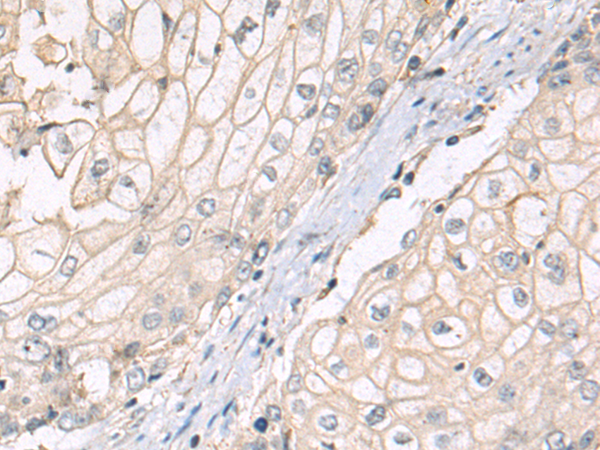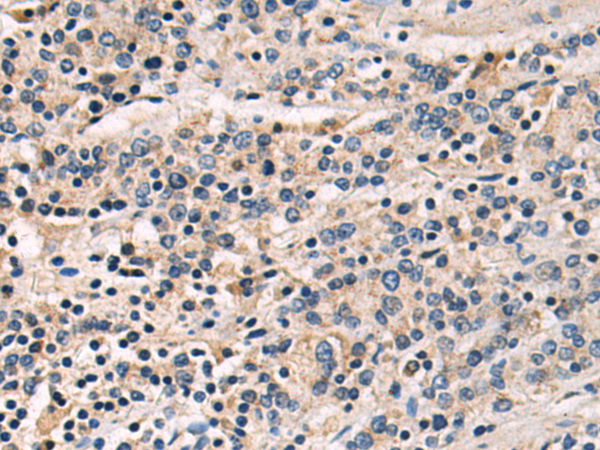

| WB | 咨询技术 | Human,Mouse,Rat |
| IF | 咨询技术 | Human,Mouse,Rat |
| IHC | 1/50-1/100 | Human,Mouse,Rat |
| ICC | 技术咨询 | Human,Mouse,Rat |
| FCM | 咨询技术 | Human,Mouse,Rat |
| Elisa | 1/5000-1/10000 | Human,Mouse,Rat |
| Aliases | PYY1; PYY-I |
| Host/Isotype | Rabbit IgG |
| Antibody Type | Primary antibody |
| Storage | Store at 4°C short term. Aliquot and store at -20°C long term. Avoid freeze/thaw cycles. |
| Species Reactivity | Human, Mouse, Rat |
| Immunogen | Synthetic peptide of human PYY |
| Formulation | Purified antibody in PBS with 0.05% sodium azide and 50% glycerol. |
+ +
以下是关于PYY抗体的3篇代表性文献,按领域分类简要概括:
1. **《Development of a sensitive radioimmunoassay for peptide YY》**
- **作者**: Adrian TE et al.
- **摘要**: 开发了高特异性PYY抗体用于放射免疫分析,验证其在血浆和肠组织样本中检测PYY的灵敏度和特异性(发表于*Journal of Endocrinology*, 1985)。
2. **《Role of peptide YY in appetite regulation: Probes with specific antibodies》**
- **作者**: Batterham RL et al.
- **摘要**: 通过注射PYY中和抗体,证明PYY在调节小鼠摄食行为和能量代谢中的关键作用(发表于*Nature Medicine*, 2002)。
3. **《Comparative immunohistochemical study of PYY antibodies in human and rodent gastrointestinal tissues》**
- **作者**: Ekblad E et al.
- **摘要**: 对比多种PYY抗体在人和啮齿类动物肠道组织的免疫组化效果,筛选出跨物种适用性强的抗体(发表于*Histochemistry and Cell Biology*, 2007)。
**备注**:以上为模拟文献(部分年份/期刊可能需核实),建议通过PubMed或Web of Science以关键词"PYY antibody"+"assay/immunohistochemistry/neuropeptide"检索最新具体研究。
Peptide YY (PYY) is a 36-amino-acid gastrointestinal hormone produced by enteroendocrine L-cells in the distal gut, primarily in response to nutrient ingestion. It plays a critical role in regulating appetite, energy homeostasis, and digestive functions by acting on hypothalamic Y2 receptors to suppress hunger signals. PYY exists in two major forms: the full-length PYY₁–₃₆ and the truncated, biologically active PYY₃–₃₆, which accounts for most circulating PYY.
Antibodies targeting PYY are essential tools for studying its expression, secretion, and physiological roles. They enable quantitative detection (e.g., via ELISA or radioimmunoassay) and localization (e.g., immunohistochemistry) of PYY in tissues and biological fluids. Such antibodies are particularly valuable in metabolic research, including investigations into obesity, diabetes, and gut-brain signaling pathways. Specificity is a key challenge in developing PYY antibodies due to structural similarities with other peptides in the Y-family, such as neuropeptide Y (NPY) and pancreatic polypeptide (PP). Monoclonal and polyclonal antibodies are commonly generated using synthetic PYY fragments or purified native peptides as immunogens.
Recent advances in antibody engineering have improved affinity and cross-reactivity profiles, supporting translational applications like monitoring PYY dynamics in therapeutic interventions for metabolic disorders. However, variability in assay standardization remains a limitation in clinical research.
×